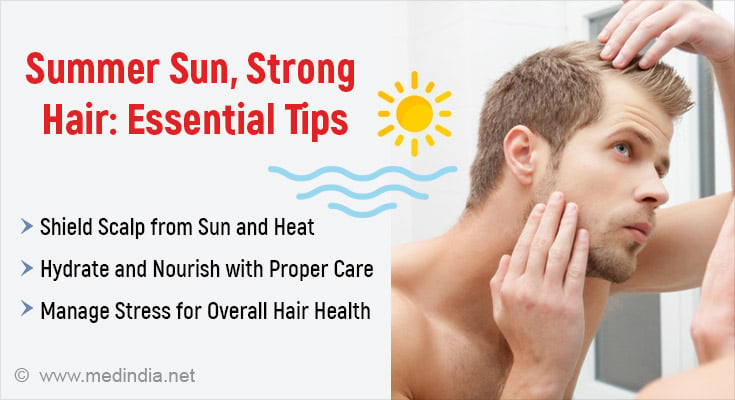- Shielding your scalp from harmful UV rays and preventing heat-induced irritation are paramount for maintaining healthy hair follicles during summer
- Keeping your scalp and hair adequately hydrated with the right products and avoiding harsh styling tools ensure the strength and vitality of your locks despite the summer heat
- Recognizing and managing stress factors during summer helps mitigate their impact on hair loss, promoting a healthier and fuller head of hair
Summer brings with it a slew of challenges, including the dreaded hair fall. For men, in particular, this season can exacerbate hair loss issues. Recent studies have shown a correlation between the summer months and increased hair shedding. Understanding the factors contributing to this phenomenon and adopting preventive measures can help men maintain healthy locks throughout the summer (1✔ ✔Trusted Source
Male Androgenetic Alopecia
).
Factors Contributing to Hair Fall in Men During Summer
Several factors unique to the summer season can contribute to hair fall:
1. Sun Exposure
Prolonged exposure to the sun’s harmful UV rays can damage hair follicles, leading to weakened hair strands and eventual shedding. This damage is compounded by the depletion of the hair’s natural oils, making it more susceptible to breakage.
2. Heat
Rising temperatures not only lead to increased sweating but can also cause scalp irritation. The excessive use of heat styling tools further exacerbates this issue by weakening the hair shaft and making it prone to breakage.
3. Stress
While summer is often synonymous with relaxation, it can also be a stressful time for many individuals. Whether it’s due to travel, family commitments, or work pressures, stress is a known contributor to hair loss.
4. Seasonal Shedding
Some individuals experience seasonal shedding, where they notice increased hair loss during certain times of the year. Although the exact cause of seasonal shedding is not fully understood, it is believed to be influenced by changes in hormone levels and environmental factors.
Preventive Measures for Summer Hair Fall
To mitigate the effects of summer on hair health, men can adopt the following preventive measures:
Advertisement
1. Protect Your Scalp:
Wear a hat or use sunscreen specifically designed for the scalp to shield it from harmful UV rays.
2. Stay Hydrated:
Drink plenty of water to keep your body and scalp hydrated, which helps maintain healthy hair follicles.
Advertisement
3. Use Gentle Hair Care Products:
Opt for mild shampoos and conditioners suitable for your hair type and scalp condition. Avoid harsh styling products that can strip away natural oils and weaken the hair.
4. Limit Heat Styling:
Reduce the use of hot styling tools such as blow dryers, straighteners, and curling irons, as excessive heat can damage the hair shaft and lead to breakage.
5. Maintain Scalp Hygiene:
Regularly wash your hair to remove sweat, dirt, and excess oil that can clog hair follicles and contribute to hair fall.
6. Follow a Balanced Diet:
Ensure your diet is rich in vitamins, minerals, and protein, which are essential for hair growth and strength. Incorporate plenty of fruits, vegetables, lean proteins, and whole grains into your meals.
7. Manage Stress:
Practice stress-reducing techniques such as meditation, yoga, or deep breathing exercises to alleviate the impact of stress on hair health.
8. Avoid Tight Hairstyles:
Avoid hairstyles that pull on the hair follicles, such as tight ponytails or braids, as this can lead to traction alopecia.
9. Consult a Dermatologist:
If you experience persistent or excessive hair fall, seek the advice of a dermatologist to identify the underlying cause and receive personalized treatment recommendations.
By being proactive and implementing these preventive measures, men can safeguard their hair health during the summer months. From protecting the scalp to managing stress levels, small changes in lifestyle and grooming habits can make a significant difference in preventing hair fall and maintaining a full head of healthy locks.
Reference:
- Male Androgenetic Alopecia – (https://www.ncbi.nlm.nih.gov/books/NBK278957/)
Source-Medindia



